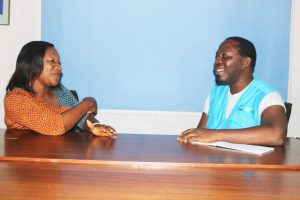 In recent years, not only has the circle of FUTURE trainers become more international, but the FUTURE method is also being used in more and more areas around the world. Most recently with the training of in-house coaches from 22 African countries (such as Cameroon, Ivory Coast, Senegal, Kenya, Nigeria and Tanzania).
In recent years, not only has the circle of FUTURE trainers become more international, but the FUTURE method is also being used in more and more areas around the world. Most recently with the training of in-house coaches from 22 African countries (such as Cameroon, Ivory Coast, Senegal, Kenya, Nigeria and Tanzania).
SOS Children’s Villages International is active in 134 countries around the world supporting the welfare and protection of children. In 2020 it started with a completely new approach to learning and development for the care professionals who work directly with children and young people on a daily basis, the SOS Children’s Village mothers and fathers.
Like every person and every organization, every country and every continent has its own special circumstances. Our particular challenge in this project was to do justice to the cultural requirements and expectations of the different African countries.
An experienced youth worker from Namibia describes his motives for training as a coach:
Our youth unemployment in Namibia is almost 50%. It is particularly difficult for children who did not have parental care. Children who have been abused, who have no one to stand behind them. In my work I want to contribute to creating a safe and loving environment where learning and development is part of their lives, so that young people can develop respect and dignity and be able to shape their lives independently.”

In 2022, FUTURE was commissioned to develop the training program for these L&D coaches and to implement it in a pilot project in Africa.
Under the leadership of our French FUTURE colleague Maryvonne Lorenzen, two courses in English and one in French have now been held. The aim is to help people develop those skills that they can use to develop themselves and other people on their own responsibility.
The nature of the task presented us with numerous challenges that had to be mastered. Among other things, these were:
- Participants from different countries with different languages
- A variety of life-experience, roles and backgrounds – from qualified psychologists to tr children’s village parents, with little academic education.
- To enable the care professionals could implement their learning straight away in their everyday lives.
Fortunately, we were able to draw on numerous strengths, including these:
- 30 years of experience in conducting coaching training, 15 years of which included trainings for in-house coaches
- The approach of perceptive pedagogy developed by FUTURE with its guiding principle: „Only people who are themselves empowered are able to help empower others“.
- A good understanding of the international coaching world through our many years of worldwide work as assessors within the framework of the ICF

Before the training, we held detailed one-on-one interviews with all participants, which helped us to quickly arrive at the topics relevant to the participants.
Never too academic, but always practical and relevant for everyday life.
From the first day of training, we focused on practical work, such as discussing development and learning and using coaching tools. Again and again we were surprised how quickly the understanding for the underlying attitudes and the sensitive feeling for the subtleties of communication was picked up and understood. The practice-orientation of the training, strengthened the coaches in those areas that are central to their everyday roles in the SOS Children’s Village.
A few representative voices of the coaches describe the training as follows:
“I now see people through their eyes for their potential success rather than their weaknesses. The L&D Coach training opened my eyes to the inherent potential in people.”
“My absolute favorite from the skills I learned is cultivating security and trust with the coachee. This is so important to me because it is crucial when working with children and young people. This principle gives the coachee the security that he/she is really being supported on the way to achieving personal goals.“
“I can feel my commitment to my job as an SOS Children’s Village Care Professional being completely renewed. From this L&D Coach training I take with me strengthened skills such as empathy and an appreciation of diversity and inclusion. I can listen better and connect more deeply with people.”
We FUTURE coaches were very happy to experience how the FUTURE method and our coaching approach are effective under different cultural and linguistic conditions. The enthusiasm and joy of our African coach colleagues gave us a lot of energy – and we also learned a lot from them.
A great compliment was the feedback from Stewart Wilms, (International Director of Program Development, SOS Children’s Villages International): „With this coaching approach you touch the core of our organization!“

In our opinion the essential factors, listed below, led to the success of this project.
- A deep respect for the individual life-path and development of every person that the in-house coaches felt during this training.
- The value placed on the experience of being noticed, valued and understood.
- The coaching attitude and coaching tools provided by FUTURE coaching, that strengthens authenticity and heart competence.
- As trainers, we were also open and able to learn a lot from our African coaches.
- The emphasis placed on enabling autonomy, independence, and people’s freedom of choice, sharing the joy of their own development.
- Offering the understanding that by developing coaching skills all sorts of other skills are also improved.
- Appreciating that the FUTURE method appeals to people with a high academic education and everyday practitioners with less formal education, in being not thinking.
- That networking beyond borders, was enabled. For example, Psychologists who usually work alone in their SOS village, had the opportunity to share their experiences with other professionals during the training.
- That participants experienced how empowerment works and that they can support others to find solutions themselves. Also, with increased self-confidence they could manage their daily tasks more easily.
- That it is precisely the renunciation of „advice“, from expert authority, that makes it possible to the connect to one’s own resources and trust in oneself.
- Noting that for many, coaching is more accessible than traditional training, because your own emotions, which tend to be held back, have their place.
- Giving notes…we noted that people are not overwhelmed by more than 100 pages of written L&D competencies and can easily make use of them in their lives.
Key facts about the project
+Participants from 22 African countries
+Scope of training:
- 60 h coach training (according to ICF Level 1)
- 5 hours of individual mentor coaching
- 8 h peer groups
- Final coaching with feedback from ICF Master Certified Coach
Regular supervision after the training

About Wolfgang Steger
As the program director of this project, it was and is Wolfgang’s job, in close cooperation with Bianca Helfer and Maryvonne Lorenzen, to tailor the training as precisely as possible to the needs, possibilities and goals of all those involved.

About Bianca Helfer
As the initiator and internal project manager at SOS Children’s Villages International, Bianca Helfer plays a central role in the success of the project. With her great intuition and experience from numerous FUTURE training courses, she makes an invaluable contribution to the successful planning and implementation.nschätzbaren Anteil an der gelungenen Planung und Umsetzung.

About Maryvonne Lorenzen
A project of this magnitude requires a great deal of instinct and experience. Maryvonne herself lived and worked in Africa for several years and conducted training, leadership programs and coaching in numerous parts of the world. For more than 20 years, Maryvonne has been involved in the worldwide certification of coaches within the framework of the ICF (International Coaching Federation) and co-founded ICF Germany.
Learn more about the work of FUTURE-International.
